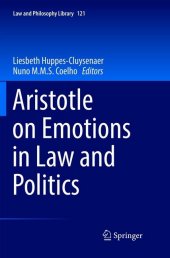 Neuerscheinungen 2019Stand: 2020-02-01 |
Schnellsuche
ISBN/Stichwort/Autor
|
Herderstra▀e 10
10625 Berlin
Tel.: 030 315 714 16
Fax 030 315 714 14
info@buchspektrum.de |

Liesbeth Huppes- Cluysenaer, Nuno M.M.S. Coelho, Liesbeth Huppes-Cluysenaer
(Beteiligte)
Aristotle on Emotions in Law and Politics
Herausgegeben von Huppes-Cluysenaer, Liesbeth; Coelho, Nuno M.M.S.
Softcover reprint of the original 1st ed. 2018. 2019. xiv, 473 S. 2 SW-Abb. 235 mm
Verlag/Jahr: SPRINGER, BERLIN; SPRINGER INTERNATIONAL PUBLISHING 2019
ISBN: 3-319-88304-6 (3319883046)
Neue ISBN: 978-3-319-88304-5 (9783319883045)
Preis und Lieferzeit: Bitte klicken
In this book, experts from the fields of law and philosophy explore the works of Aristotle to illuminate the much-debated and fascinating relationship between emotions and justice. Emotions matter in connection with democracy and equity - they are relevant to the judicial enforcement of rights, legal argumentation, and decision-making processes in legislative bodies and courts. The decisive role that emotions, feelings and passions play in these processes cannot be ignored - not even by those who believe that emotions have no legitimate place in the public sphere.
A growing body of literature on these topics recognizes the seminal insights contributed by Aristotle. This book offers a comprehensive analysis of his thinking in this context, as well as proposals for inspiring dialogues between his works and those written by a selection of modern and contemporary thinkers. As such, the book offers a valuable resource for students of law, philosophy, rhetoric, politics, ethics and history, but also for readers interested in the ongoing debate about legal positivism and the relevance of emotions for legal and political life in today┤s world.
Part I. Introduction.- Chapter 1. The Debate about Emotion in Law and Politics (Liesbeth Huppes-Cluysenaer).- Chapter 2. Judicial Emotion as Vice or Virtue: Perspectives both Ancient and New (Terry A. Maroney).- Chapter 3. Dispassionate Judges Encountering Hotheaded Aristotelians (Christof Rapp).- Part II. Cognition.- Chapter 4. Emotion and Rationality in Aristotle┤s Model: From Anthropology to Politics (Giovanni Bombelli).- Chapter 5. Logoi enuloi. Aristotle┤s Contribution to the Contemporary Debate on Emotions and Decision-making (Stefano Fuselli).- Chapter 6. Aristotle┤s Functionalism and the Rise of Nominalism in Law and Politics: Law, Emotion and Language (Saulo de Matos).- Chapter 7. On Logos, Pathos and Ethos in Judicial Argumentation (Fabiana Pinho).- Chapter 8. Religion of Humanity. A Shift from a Dialogical to a Categorical Model of Rationality (Liesbeth Huppes-Cluysenaer).- Part III. Moral Agency.- Chapter 9. Aristotle on Emotions in Ethics and in Criminal Justice (JosÚ de Sousa e Brito).- Chapter 10. Ethical Theory and Judicial Practice: Passions and Crimes of Passion in Plato, Aristotle and Lysias (Cristina Viano).- Chapter 11. What does Nemesis have to do with the Legal System? Discussing Aristotle┤s Neglected Emotion and its Relevance for Law and Politics (Daniela Bonanno and Lucia Corso).- Chapter 12. Rethinking Legal Education from Aristotle┤s Theory of Emotions and the Contemporary Challenges of the Practical Realization of Law (Ana Carolina de Faria Silvestre).- Chapter 13. Remorse and Virtue Ethics (Humber van Straalen).- Chapter 14. Virtue as a Synthesis of Extremes versus Virtue as a Mean between Extremes. A Comparison of Chesterton┤s Account of Virtue with Aristotle┤s (Wojciech Zaluski).- Chapter 15. The Place of Slavery in the Aristotelian Framework of Law, Reason and Emotion (Peter Langford and Ian Bryan).- Part IV. Legitimation.- Chapter 16. Empathic Political Animal: What a North Korean Prison Camp can reveal about the Aristotelian Political Association (Tommi Ralli).- Chapter 17. How Emotions can be Both an Impediment as well as a Basis of Political Life (Nuno Coelho).- Chapter 18. Aristotle┤s Rhetoric and the Persistence of the Emotions in the Courtroom (Emma Cohen de Lara).- Chapter 19. Rhetoric, Emotions and the Rule of Law in Aristotle (Daniel SimĂo Nascimento).- Chapter 20. Aristotle┤s Political Friendship (politik philia) as Solidarity (Misung Jang).- Chapter 21. Between Nomos and Pathos: Emotions in Aristotelian Theory of Adjudication and the Dual Process Theory (Mariusz Jerzy Golecki and Mateusz Franciszek Bukaty).


